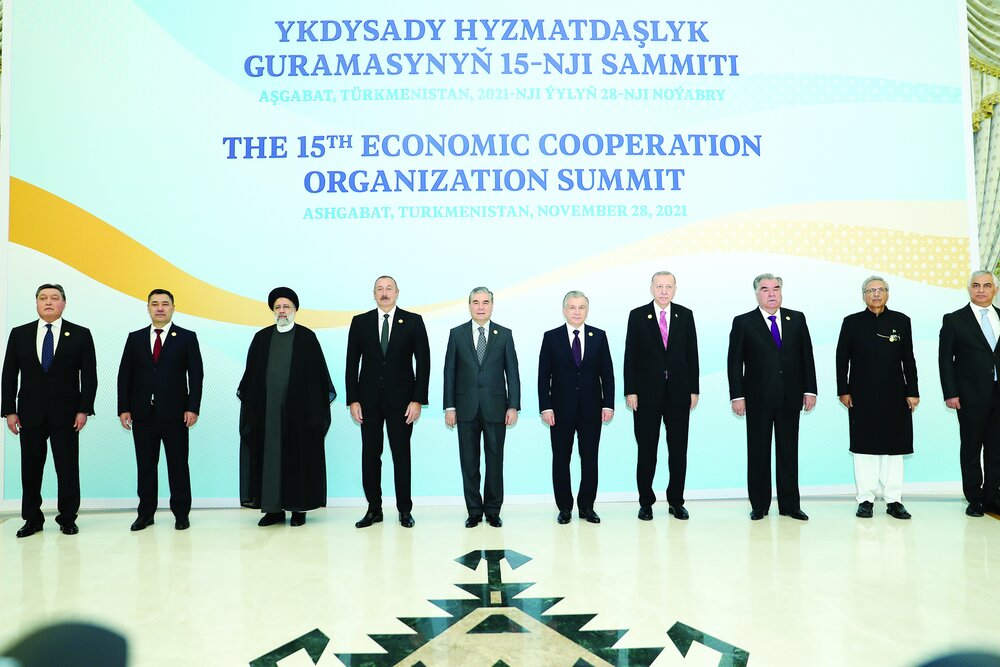Iran embarks on “neighborhood” foreign policy

TEHRAN — In his trip to Turkmenistan, Iranian President Ayatollah Seyyed Ebrahim Raisi and his high-ranking delegation held several bilateral meetings in Ashgabat, reaffirming the fact that Iran is following a balanced, Asia-oriented foreign policy.
President Raisi arrived in Ashgabat on Saturday to attend the 15th Economic Cooperation Organization summit. Later that day, he met with his Turkmen counterpart, Gurbanguly Berdimuhamedow.
The two sides discussed developing bilateral relations and increasing the level of trade between the two countries during the meeting.
On Sunday, Raisi spent a busy day, meeting Turkish President Recep Tayyip Erdogan and Azeri and Pakistani counterparts.
During the meeting, Raisi said that Iran and Turkey can bring economic and political relations closer to the strategic level by improving the current level of trade exchanges.
Referring to the wide and diverse areas of cooperation between Iran and Turkey in various sectors, including energy, banking and monetary issues, and trade and commerce exchanges, Raisi said, “We should facilitate the development of economic relations and in this regard, preferential tariffs can be reviewed.”
Emphasizing the close cooperation and relations between Iran, the Republic of Azerbaijan and Turkey, the president said that the three countries have many cultural, religious and ideological affinities, and these relations should not be allowed to be disrupted. Instead, Raisi suggested, relations should be as close as possible to disappoint the common enemies.
Further, he touched upon the Afghanistan issue, saying, “Terrorist groups not only cause insecurity in Afghanistan but also threaten the security of the region, so we should not allow terrorist groups such as Daesh (ISIS) and the PKK to threaten the security of countries in the region.”
The president added that Iran supports the formation of an inclusive government in Afghanistan.
“We believe that all groups and ethnicities of Afghanistan should have a role and participation in the future of Afghanistan,” he elaborated.
Referring to the establishment of stability and security in Syria, Raisi said, "We should use our capacities to create peace and security in Syria.”
For his part, Erdogan said that his country considers it necessary to develop and strengthen bilateral and regional cooperation with the Islamic Republic of Iran.
“We can make a leap in the relations between the two countries, especially in the economic sectors,” Erdogan said.
“The White House is training and arming all terrorist groups in the region, including ISIS and the PKK, and providing them with terrorist equipment and tools to create insecurity,” he said.
Erdogan added that Iran, Russia and Turkey can maintain security and stability in the region with the cooperation of other countries in the region.
Iran, Azerbaijan sign deal that allows Turkmenistan to swap gas with Azerbaijan
Later in the day, Raisi met the Azerbaijani President, Ilham Aliyev.
After the meeting ended, Iran and Azerbaijan signed a deal that allowed Turkmenistan to swap gas with Azerbaijan, using the Iranian territory.
The agreement was signed with the presence of ministers of oil of Iran and Azerbaijan in Ashgabat on the sidelines of the 15th Economic Cooperation Organization (ECO) summit.
According to the agreement, Turkmenistan will export one and a half to 2 billion cubic meters of gas to the Republic of Azerbaijan through the territory of Iran.
The agreement also made Turkmenistan sell 5 to 6 million cubic meters of gas a day to the Republic of Azerbaijan.
Iran will withdraw its required gas consumption in five northern provinces of the country as the right for transfer the gas.
In this regard, Iranian Foreign Minister Amir Abdollahian also met with his Azeri counterpart, Jeyhun Bayramov.
During the meeting, Amir Abdollahian hailed as important cooperation at various political, economic, cultural areas as well at the level of officials, including presidents, foreign ministers, etc.
He lauded Azeri Deputy PM and Chairman of the Joint Commission’s visit to Iran.
Iran’s top diplomat described the meeting between Iran and Azerbaijan officials as indicating the right path of diplomacy.
He also congratulated Azerbaijan’s membership in the UNESCO Executive Board and stressed the importance of developing international cooperation.
These developments come at a time as Iranian Deputy Foreign Minister Ali Bagheri is in Vienna to discuss ways to remove the sanctions imposed by the United States on Iran.
This shows that Iran has changed direction, and is now focusing on a balanced foreign policy. Relying solely on the West is not on the agenda of the Foreign Ministry anymore.
As Amir Abdollahian explained in his 100-day report on November 27, Iran is seeking to pursue an “Asia-oriented” foreign policy, with particular emphasis on neighbors.
It also sends the message that Iran is past the “unwanted” tension with Azerbaijan, as Foreign Ministry spokesman Saeed Khatibzadeh put it in his press briefing on November 22.
Truly, a new day has come.
